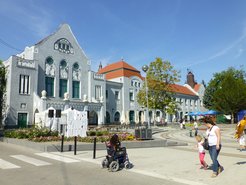Realising Eurasia: Civilisation and Moral Economy in the 21st Century
A comprehensive presentation of this project, which is supported by the European Research Council, is available HERE.
Neoliberal Economics and Illiberal Politics on the Danube-Tisza Interfluve
Chris Hann
As the Principal Investigator of “Realising Eurasia”, Chris Hann does not have the time to participate with a full-time empirical project. He is nonetheless contributing through on-going research designed to dovetail with the projects of the doctoral students. What his work lacks in terms of comprehensive fresh data from the field is compensated by the fact that it draws on four decades of familiarity with the field site, the western zone of the Great Hungarian Plain, between the rivers Danube and Tisza. The major innovation of the current phase of this long-term project is that Hann is extending his study of the village of Tázlár to focus more on the nearby market town of Kiskunhalas (population circa 30,000 and, like that of Tázlár, steadily falling).
In the domain of economy, Hann is interested in changes in the factors of production in the era of neoliberal capitalism. The county town of Kecskemét has recently attracted a massive investment by Mercedes-Benz. Jobs in this factory are attractive compared to other opportunities in the region, but it is too distant to permit easy daily commuting from Tázlár and Kiskunhalas. Many young people work abroad, while the least mobile (irrespective of age) participate in workfare schemes. Hann delves into the moral dimensions of each of these options. In addition he is gathering data on small businesses in Kiskunhalas, a town which is rather typical of provincial Hungary in the way that established socialist enterprises were privatized in the 1990s.

The changes since Hann’s original doctoral research are even more dramatic in the realm of politics. In the 1970s and 1980s there was a general sense of economic buoyancy, yet relatively few inhabitants had a good word for socialist power holders. Nowadays, despite social fragmentation and limited economic options, the provinces vote solidly for the populist government of Viktor Orbán. Hann’s project explores the consolidation of a new one-party system at the local level, paying attention to changes in memory politics and the role of religion in cementing national and even “civilizational” consciousness. In the background is the “migrant crisis” that erupted in summer 2015. Hungarian populists continue to instrumentalize this alleged threat to Europe, in order to provide ethical justification for their explicitly “illiberal” version of democracy. “Old Europe” is appalled, expects Budapest to embrace “European values”, and asks why Hungarians are not more grateful for the subsidies they receive from the European Union. But critics point out that the sums repatriated by transnational corporations such as Mercedes-Benz are actually larger than the transfers which Hungary (and other members of the “Visegrád Group”) receive from Brussels.
Cooperating Partners:
Kiskunhalas: Thorma János Museum (Aurél Szakál, Director)
Budapest: Attila Melegh, Karl Polanyi Centre for Global Social Studies, Corvinus University
